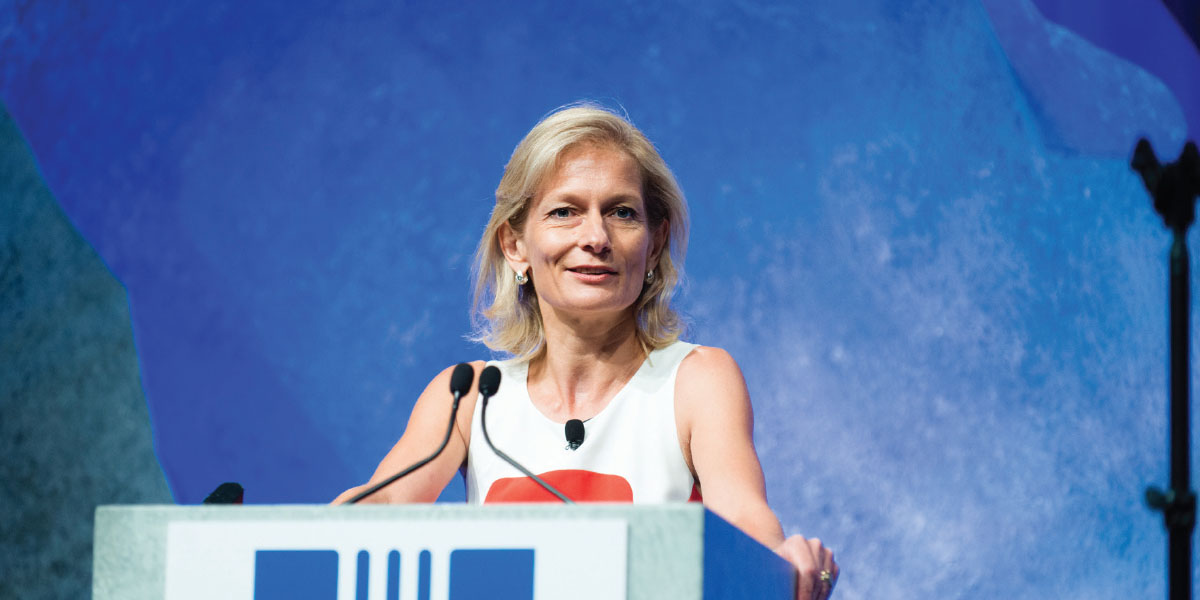
ECONOMICS
Bold Thinking for a Better World

When I look back at the early 20th century, I’m struck by not only the innovation taking place, but by the great public policy developments,” said Zanny Minton Beddoes, at Tuesday’s closing general session.
Beddoes, economics editor for The Economist and a frequent television and radio commentator, pointed out that “it was a time when the U.S. pioneered secondary and tertiary education. We are not thinking nearly as boldly today as we could as a country. So much depends on how creatively institutions and policymakers move to transfer the ways we fund education and how we deliver it.”
Two global factors are producing a tectonic shift, explained Beddoes. “Growth of technology and aging populations in many countries are changing the world in ways that make it virtually unrecognizable.” Everyone’s jobs will be affected on a scale that is potentially huge, suggested Beddoes. “A huge and growing challenge is how to prepare people for such a shift. We must rethink the way we educate people—education can be an equalizing force in an environment where the world overall is becoming less unequal, but in individual countries, such as the U.S., inequality is growing dramatically.”
Concluded Beddoes: “It is an exciting time and a scary time—and you, as higher education business officers, have a huge responsibility, and you can make a huge difference.”
INSIGHTS
CBOs Take to the Stage

In a personalized and interactive presentation patterned after TED Talks, four CBO thought leaders reflected on the changing role of the CBO position and the insights they’ve gained through a variety of experiences that both challenged and honed their leadership skills.
Following are capsules of individual comments describing growth experiences:
- Be able to tolerate ambiguity. This was the condensed version of Nikki Krawitz’s story—based on reporting to six different university presidents within 13 years. Krawitz, who recently retired as vice president of administration and finance at the University of Missouri System, described the often-contradictory leadership styles of the various leaders and concluded that CBOs must “expect the unexpected. Sometimes your effectiveness depends on your ability to respond to significant changes on a moment’s notice.”
- Develop a thick skin. “Understand that your role is leadership—to articulate and execute the institution’s vision and goals,” said Nim Chinniah, executive vice president for administration and chief financial officer, University of Chicago. Know that everything is not solved in the same way, said Chinniah, and your decisions may not always be popular. “You are not going to be a specialist in everything, so hire people who can find the answers.”
- Consider yourself a musical conductor. Basing his presentation on a musical metaphor, Michael Unebasami, associate vice president for administrative affairs, University of Hawaii Community College, described strategic plans as score sheets and his staff as the orchestra. “As conductors,” he said, “we play the leadership position, keeping the staff finely tuned and everyone working together to deliver the best performance.”
- Realize that laughter is the greatest medicine. “Two things I think about almost every day,” said Roger Bruszewski, vice president for finance and administration, Millersville University, Millersville, Pa., “are a work environment that is fun and a passion for the job.” For Bruszewski the latter means tangible and visible work. “I like to see construction projects,” he said. “We will spend a half billion dollars in the next few years—and that will change the campus for the next 50.”



